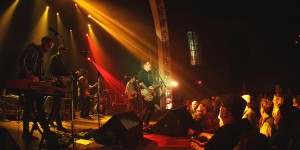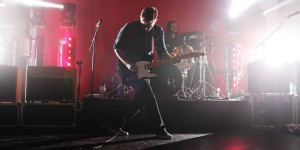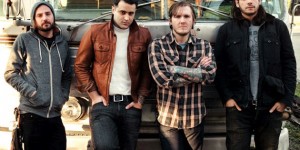Brian Fallon turns his anguish into armour
by Luke Ottenhof
July 8, 2016
The Gaslight Anthem frontman discusses the bare-knuckle Americana of his solo debut.
Photo: Danny Clinch
It was a balmy Saturday morning in December when my pal Stew and I left our downtown Toronto hotel and piled into a Volkswagen, due south-east for Garwood, New Jersey. We stopped at the border, uneventfully. The US border guard inquired about our trip; “We’re going to see Brian Fallon in New Jersey tonight, and we’re coming back tomorrow,” we offered. He paused, then pressed, eyebrows raised, “All that way for one show?”
Just one show. And the Dunkin Donuts, Sonics, and Marlboros. A shabby motor inn in Neptune City. Hungover breakfast in Asbury Park. Walking by an undecorated old fellow playing an organ grinder under the shade of a hollowed-out, abandoned casino, a butt of a cigarette dangling loose between his teeth. It wasn’t about staking our flag. It was a pilgrimage to songs about girls named Maria, dancing on architecture, diamond Sinatras, and radios always, always on.
When I sent a picture saying, “Greetings from Asbury Park,” to my friends, I had a Springsteen album cover stuck in my head, and a Brian Fallon t-shirt on. I was 22 and not sure what to make of everything, but I knew one thing for truth; the songs those guys wrote felt like home, and my eyes were finally seeing what theirs had, and I could see their songs unfolding in footsteps on the boardwalk and waves collapsing against the coast and street lights changing from green to yellow to red and back again.
Brian Fallon, the beloved wordsmith and frontman of stalwart Jersey outfit The Gaslight Anthem, is striking out on his own while the band is on hiatus. His debut solo record, the delightful Painkillers, came out earlier this year on Island Records. Tendencies run high to champion solo records as a departure, a journey of self-exploration and carving out a separate identity. But Fallon wasn’t looking to go paint his masterpiece, or craft a grand cultural touchstone; he was just coming home.
“When I sat down to write the songs for this record, I said, ‘Why did you get into music in the beginning?'” Fallon says. “‘Just do that. Just go back to the singer-songwriters, sit down with your guitar, and write songs like you did when you were 15.’ And that’s what I did.”
Holed up in Nashville with all-star producer Butch Walker, Fallon manned a ship himself that previously had a crew of five. While the Gaslight Anthem worked on their records democratically, the 36-year-old found himself in just one set of comfortable arms: his own. And they pointed him back where he came from. They pointed him to Springsteen, to Petty, to Dylan, to sparks flying from a streetlight kiss on Cookman Avenue, to long-haul drives with the ragged sails high, and the radio on.
“I got away from that the last four years, and on this one, I decided, ‘Why are you getting away from that? That’s what you do,’” Fallon explains. “’You’re maybe one of the last couple people doing that traditionalist music.’ It’s what I do. I can’t run from it. I feel that’s my place; I’m just part of the tradition.”
The new record is beautifully crafted, and plays much like a string of sharp, brownish-yellow lightbulbs breathing life into an antiquated, gorgeous old dance hall that’s just been rediscovered after years of slumber. The full-throttle Born to Run-style anthem “A Wonderful Life” shouts all the tremendous, quixotic charm Fallon’s typified for a decade; it’s clamouring with excitement, starry eyes and sidewalk romances, trying to find love and just some room to breathe in the backseat of some burned out Chevrolet.
Rollicking, hammering stomp-and-clap burner “Smoke” begs the same energy and intimacy, and Fallon’s bombastic, fire-side vocals for the track were recorded all in one take. Walker was firm from the outset that he wasn’t going to give Fallon’s vocals “the Gaslight treatment,” and stripped the vocal tracks down to naked, unaffected glory.
“I sang [Smoke] one time, and he goes, ‘I think we might keep some of this,’” he laughs. “He’s like, ‘Nah, we’re gonna keep the whole thing. You don’t need to sing that again.’”
“It had a little bit of a country shuffle when I had recorded the demo,” Fallon continues. “I said, ‘Do you think you could straighten this out a little?’ I’m from New Jersey, man. I don’t want to do a country record cause I don’t want to feel like I’m faking it. I said, ‘I like Bob Dylan, Bruce Springsteen, Tom Petty, that kind of stuff. Can you make it like that?’ I came back the next morning and he was like, ‘I didn’t even put drums on it. I was just running around the room all morning stomping and clapping.’”
The lyrics on Painkillers follow a similar line. As opposed to the at-times disjointed and delineated writing on Gaslight’s 2014 release Get Hurt, Fallon’s let the words travel from heart to limb to pen. Talk of undecorated cigarettes, picture shows, and honey Magnolia abound, woven with Fallon’s weathered hands into a self-fulfilling record where the line, “My name is Rosemary, and you’d be lucky to meet me,” is growled with the urgency and confidence that tell you these are Fallon’s sentiments turned into song. The affecting slang and bare-knuckle wordplay aren’t an easy way out, though.
“It’s so complex,” Fallon muses. “When I sat down to do this record, Butch said, ‘No fluff in the lyrics.’ I didn’t understand. I was like, ‘You don’t want me to use poetry? That’s where I come from.’ He goes, ‘I want you to say what you mean, and if you use colourful words, make them count.’ Don’t just paint pictures to lead people around.”
“I’d write these landscapes of words and use this serpentine kind of lyrical flowing. He was like, ‘That doesn’t mean anything.’ I came in with something that I thought was really clever, and it meant something to me, and he goes, ‘That’s just fluff.’ He goes, ‘You think Bob Dylan is so crazy with the words? How about this: I want you, I want you, I want you so bad.’”
Fallon has been vehement in stating he will not be playing Gaslight songs on his solo tour; naturally, he didn’t want his solo debut to merely be a pastiche, or become a one-trick cover act. But at the Troubadour on a California night, he stood alone, centre-stage, guitar slung close, as The ’59 Sound’s album closer, “The Backseat,” haunted the venue.
“It’s definitely not something I would do every night,” he quickly asserts. “But the feeling kind of came over me. It was more for me, where I wanted to play that venue, and Gaslight never played there. I was like, ‘I’m going to do this, because I need to stake the flag.’ It’s not about doing the song and being like, ‘look at this song, it’s mine.’ It’s more about acknowledging that this is where I come from, I’m proud of it, and don’t forget about it.”
Thematically, the new record finds heavier traces of self-preservation and realization; maybe not everything has to be saved. “We say such foolish things like ‘love, love, love, love is all we need,’” growls Fallon on “Among Other Foolish Things.” It’s a common sentiment; we’re older now, and we did it when we were young, and that’s alright. But old habits die hard, and the romance and nostalgia etched across Fallon’s writings are still sung loud and proud.
“I think to be jaded is really easy, but it’s also a really boring place to be,” he remarks. “People write about what they hate, they tweet about what they don’t like, and I was like, ‘what if you didn’t do that, and you just said what you did like?’ That would be better.”
‘What if you didn’t do that, and you just said what you did like?’ Maybe it’s Fallon’s desperate positivity, and endless commitment to finding beauty and hope amidst the wreckage of some great, Casablanca-esque love, that make his songwriting as enchanting, endearing and intoxicating as it is. You could turn your back, quit, cast your eyes down, and accept that all good things should fall apart.
But instead, perhaps just one time you could let the wild notion win that maybe, just maybe, there’s enough magic, spirit and luck floating on the wind that you could get back to that place; maybe American Slang’s “The Spirit of Jazz,” where Fallon pleads, “Was I good to you, the wife of my youth? Not another soul could love you like my rotten bones do,” ought to be given a shot.
Maybe the last-ditch attempt at love and redemption on 2008’s “Meet Me By The River’s Edge” is worth buying into. Maybe Fallon’s “A Wonderful Life,” isn’t about just a simple dream. Maybe it’s about acknowledging the darkness on the edge of town, the flat tires, the boarded-up store fronts, and waiting at the diner a million nights with only a coffee, a waiter, and a consolation sigh. Maybe it’s choosing to pull out the silver lining, no matter how damn deep and hard to reach it is. It’s about turning your anguish into armour, and being proud.
Works of pop culture and art share an incestuous relationship with themselves. Without Woody Guthrie, Bob Dylan’s catalogue would look unrecognizable. Without a Robert Mitchum movie, we might not have the mighty “Thunder Road.” And without Springsteen, we might not have Brian Fallon. These writers are all proud to wear their influences on their sleeve; without them, where would they be?
“We were just speaking the language that we were taught,” Fallon stated in a recent Zane Lowe interview. And now, young writers get to learn and share and transform and repurpose the American slang that Brian Fallon has created. The cycle continues, with his words woven into the narrative that he’s borrowed from.
“I hope some day if they write a book about American songwriting and I got included in that book, that I would just be part of it,” he posits. “I don’t care where I would be, or how high I would be ranked. I just want to be in that. It’s like those old folk songs like ‘If I Had a Hammer.’ I feel like I’m just pounding the railroad.”
The energy and truth and enormousness of these thoughts are evidenced in a breathless, urgent flurry.
“I’m only walking my mile. That’s all I’m responsible for. I’m just trying to walk my mile, as best as I can.”
And a damn good job well done so far. No surrender, my Bobby Jean.
Brian Fallon performs Friday, July 8th at the London Music Hall (London, ON) and Sunday, July 10th at Le Festival d’été de Québec.
Tags: Music, Featured, Interviews, Brian Fallon, The Gaslight Anthem





